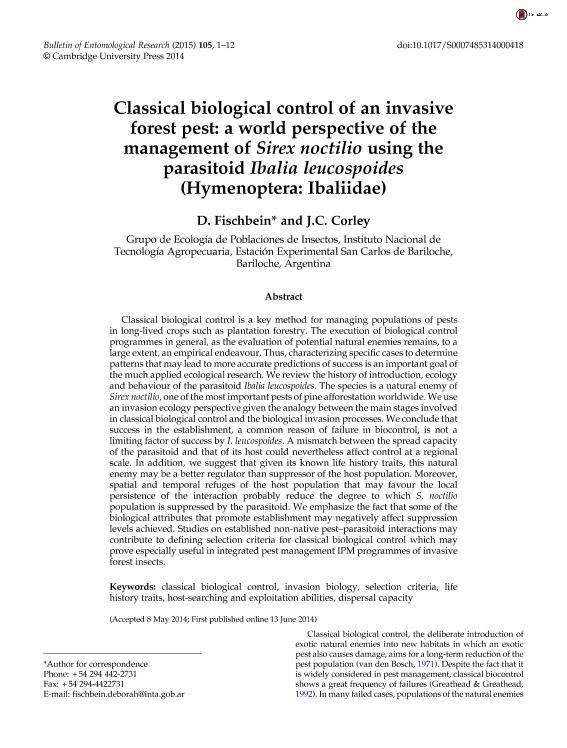Mostrar el registro sencillo del ítem
dc.contributor.author
Fischbein, Deborah

dc.contributor.author
Corley, Juan Carlos

dc.date.available
2018-03-07T19:08:12Z
dc.date.issued
2015-02
dc.identifier.citation
Fischbein, Deborah; Corley, Juan Carlos; Classical biological control of an invasive forest pest: A world perspective of the management of Sirex noctilio using the parasitoid Ibalia leucospoides (Hymenoptera: Ibaliidae); Cambridge University Press; Bulletin of Entomological Research; 105; 1; 2-2015; 1-12
dc.identifier.issn
0007-4853
dc.identifier.uri
http://hdl.handle.net/11336/38170
dc.description.abstract
Classical biological control is a key method for managing populations of pests in long-lived crops such as plantation forestry. The execution of biological control programmes in general, as the evaluation of potential natural enemies remains, to a large extent, an empirical endeavour. Thus, characterizing specific cases to determine patterns that may lead to more accurate predictions of success is an important goal of the much applied ecological research. We review the history of introduction, ecology and behaviour of the parasitoid Ibalia leucospoides. The species is a natural enemy of Sirex noctilio, one of the most important pests of pine afforestation worldwide. We use an invasion ecology perspective given the analogy between the main stages involved in classical biological control and the biological invasion processes. We conclude that success in the establishment, a common reason of failure in biocontrol, is not a limiting factor of success by I. leucospoides. A mismatch between the spread capacity of the parasitoid and that of its host could nevertheless affect control at a regional scale. In addition, we suggest that given its known life history traits, this natural enemy may be a better regulator than suppressor of the host population. Moreover, spatial and temporal refuges of the host population that may favour the local persistence of the interaction probably reduce the degree to which S. noctilio population is suppressed by the parasitoid. We emphasize the fact that some of the biological attributes that promote establishment may negatively affect suppression levels achieved. Studies on established non-native pest-parasitoid interactions may contribute to defining selection criteria for classical biological control which may prove especially useful in integrated pest management IPM programmes of invasive forest insects.
dc.format
application/pdf
dc.language.iso
eng
dc.publisher
Cambridge University Press

dc.rights
info:eu-repo/semantics/openAccess
dc.rights.uri
https://creativecommons.org/licenses/by-nc-sa/2.5/ar/
dc.subject
Classical Biological Control
dc.subject
Dispersal Capacity
dc.subject
Host-Searching And Exploitation Abilities
dc.subject
Invasion Biology
dc.subject
Life History Traits
dc.subject
Selection Criteria
dc.subject.classification
Otros Tópicos Biológicos

dc.subject.classification
Ciencias Biológicas

dc.subject.classification
CIENCIAS NATURALES Y EXACTAS

dc.title
Classical biological control of an invasive forest pest: A world perspective of the management of Sirex noctilio using the parasitoid Ibalia leucospoides (Hymenoptera: Ibaliidae)
dc.type
info:eu-repo/semantics/article
dc.type
info:ar-repo/semantics/artículo
dc.type
info:eu-repo/semantics/publishedVersion
dc.date.updated
2018-03-06T17:43:31Z
dc.journal.volume
105
dc.journal.number
1
dc.journal.pagination
1-12
dc.journal.pais
Reino Unido

dc.journal.ciudad
Cambridge
dc.description.fil
Fil: Fischbein, Deborah. Instituto Nacional de Tecnología Agropecuaria. Centro Regional Patagonia Norte. Estación Experimental Agropecuaria San Carlos de Bariloche. Laboratorio de Ecología de Insectos; Argentina. Consejo Nacional de Investigaciones Científicas y Técnicas; Argentina
dc.description.fil
Fil: Corley, Juan Carlos. Instituto Nacional de Tecnología Agropecuaria. Centro Regional Patagonia Norte. Estación Experimental Agropecuaria San Carlos de Bariloche. Laboratorio de Ecología de Insectos; Argentina. Consejo Nacional de Investigaciones Científicas y Técnicas; Argentina
dc.journal.title
Bulletin of Entomological Research

dc.relation.alternativeid
info:eu-repo/semantics/altIdentifier/doi/http://dx.doi.org/10.1017/S0007485314000418
dc.relation.alternativeid
info:eu-repo/semantics/altIdentifier/url/https://www.cambridge.org/core/journals/bulletin-of-entomological-research/article/classical-biological-control-of-an-invasive-forest-pest-a-world-perspective-of-the-management-of-sirex-noctilio-using-the-parasitoid-ibalia-leucospoides-hymenoptera-ibaliidae/8904348ACE1B16516317FEA5BC161118
Archivos asociados
